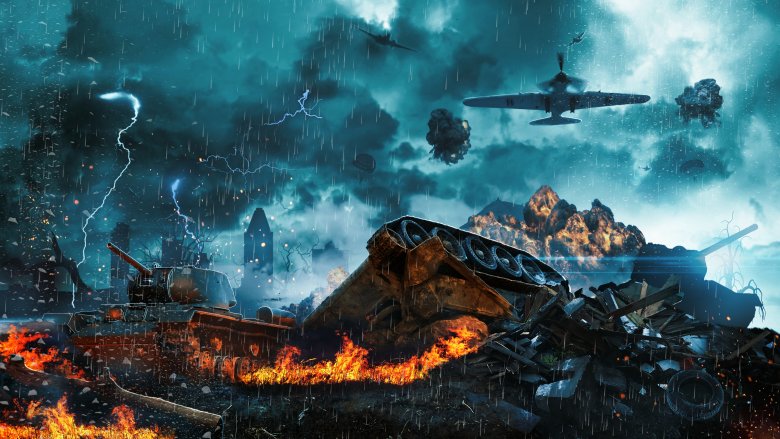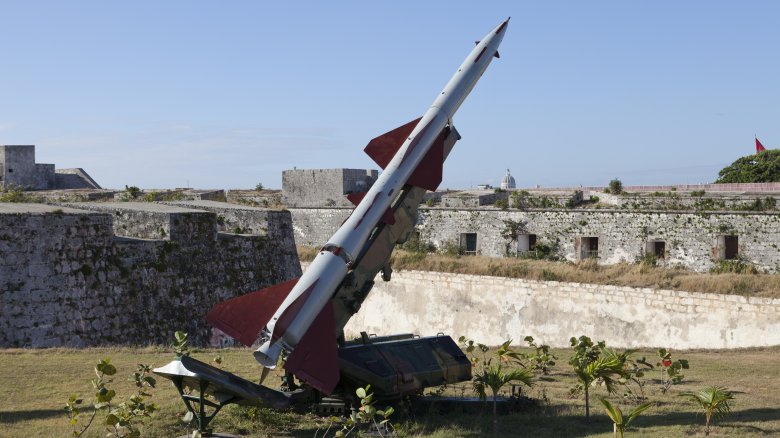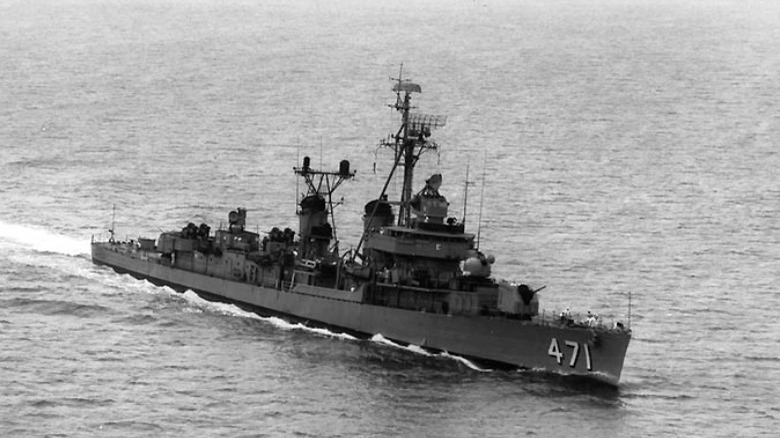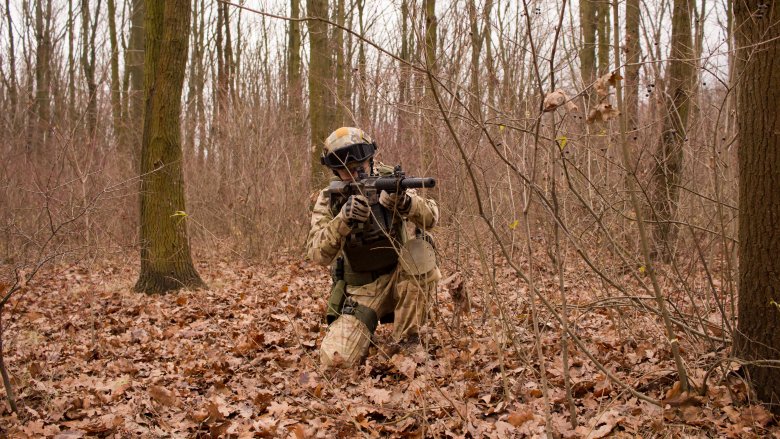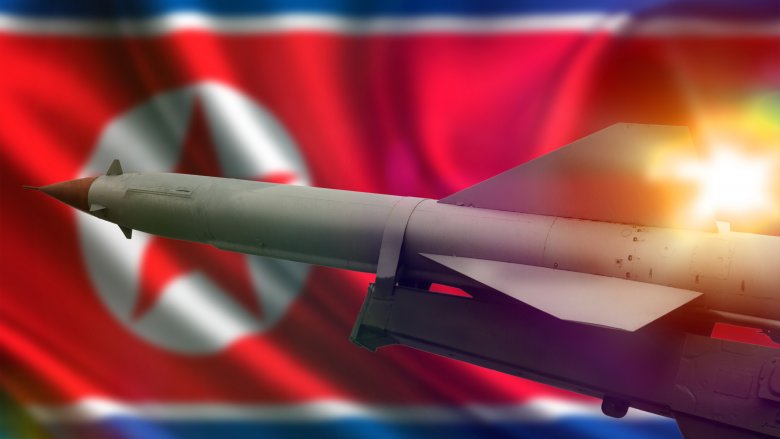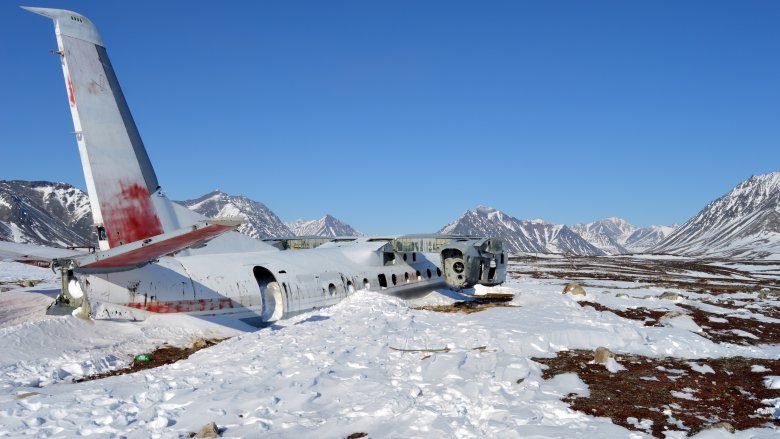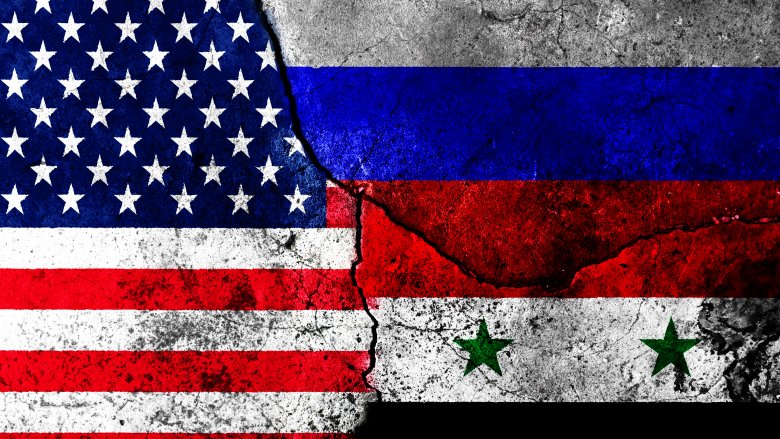Points In History That Almost Caused World War III To Happen
Most of us don't have the security clearance necessary to access the drama the world goes through on a day-to-day basis. This makes it really easy to just chill at home in our underwear, watching Netflix and eating potato chips. Meanwhile, people working for the government are making split-second decisions that could affect all our lives.
Ignorance is bliss, but eventually things become unclassified, and people can learn just how close it all came to destruction. From nuclear missile false alarms to war games to countries in crisis, here are points in history that almost caused World War III to happen.
To wake or not to wake
Adults of a certain age might remember watching the movie "WarGames" as a kid. The film assumed that a computer program would be able to start a nuclear war. In 1983, this was a scary idea, but little did anyone watching it know they had come close to being vaporized a whole four years before because of a very similar circumstance.
According to Gizmodo, on the morning of November 9, 1979, the national security adviser to President Jimmy Carter was woken up with the information that everyone he ever knew and loved was very soon about to be dead. Zbigniew Brzezinski maybe took a minute to reflect on that, but then he had to decide what to do. While even one nuke headed for the U.S. would be bad, he was told there were 250 on their way. He got another call shortly after that, saying there were now 2,200 missiles. This might have been his first inkling that something was off, since even for the USSR that seems like (literal) overkill.
He didn't even bother waking up his wife because if you're about to be incinerated, you might as well have it happen while you're still happily dreaming. He had to decide whether to respond with force and wake up the president. Fortunately, a third call told him everything was probably cool. Carter never even had his zzz's disturbed, but a computer glitch had almost ended the world.
Cuba isn't all cigars and rum
Few things have brought us closer to another world war than the Cuban Missile Crisis. It was two huge nuclear states standing toe to toe, daring each other to blink. And it wasn't until 50 years after the 1962 drama that documents were finally declassified showing just how close things came.
According to the Christian Science Monitor, the problems started when the U.S. learned the USSR was putting nukes on Cuba. JFK could have ordered an airstrike, but instead he used the navy to blockade the island. If the Soviets had decided to breach that line of ships, World War III would have started. Fortunately, they decided to turn around, but it was a very close thing.
Some historians called it the most dangerous moment in history. The president's brother, Robert Kennedy, and the Soviet ambassador were locked in taut negotiations to defuse the situation. On Cuba, the USSR was rushing to complete the installation of the nukes in case they needed to use them. RFK said, "I felt on the edge of a precipice and it was as if there was no way off." He also believed that while the president was surrounded by intelligent, level-headed people, if any of them had been in charge we would have been at nuclear war with Russia sooner rather than later. It was only because JFK was calling the shots that everything turned out okay in what could have been the end of the world.
Stanislav Petrov single-handedly stops nuclear war
September 26, 1983, is the day huge numbers of people would have died from nuclear bombs. The fact that you or your parents lived through this crisis is down to one person, a Russian named Stanislav Petrov.
According to the New York Times, Petrov was working in a secret command center near Moscow called Serpukhov-15. He held an important position. If he said nukes were incoming, his supervisors would have reported it straight to the general staff of the USSR's military, and the order to retaliate would have been almost a given. So Petrov had to be really sure before he moved things up the ladder. And fortunately for everyone in the world, on that day in September he wasn't sure.
The BBC says he received printouts that indicated the U.S. had fired some missiles at Russia. He thought it was weird they had fired so few — that's no way to end the world. Despite all his training telling him he should notify his superiors immediately, he decided to wait. When he did contact someone, it was to report a malfunction with the system, not the fact that they were all about to die.
It was still a tense time for him, and it lasted 23 minutes before he was sure he had been right about the false alarm. It had actually just been the Sun reflecting off some clouds and confusing the satellites.
Vasili Arkhipov refuses to launch a nuclear torpedo
Generations old and new are in debt to Vasili Arkhipov. Thank goodness all these Russians had their heads screwed on straight because otherwise everyone would be dead several times over.
According to The Guardian, it all started in 1962 when an American ship, the USS Beale, started dropping depth charges on the B-59 Soviet submarine Arkhipov was in charge of. What he had no way of knowing was that these were just fake rounds meant to try and get the submarine to come up to the surface. As far as he knew, they were the real deal, and the fact that a nuclear submarine was being attacked meant World War III had started.
If he had ordered a launch against the giant aircraft carrier, the USS Randolf, nuclear war would have begun. If the Randolf went down, orders would have come to hit London and parts of Germany. Then they would have hit "economic targets," which is a less gross way of saying "killing innocent civilians." It's estimated that half the U.K. would have been wiped out. The Americans, meanwhile, would be busy hurling 5,500 nuclear weapons all over the globe, including places that are definitely not Russia, like China and Albania.
Thankfully, the exhausted Arkhipov refused to launch any nukes. He saved literally millions of lives that day.
NATO war game almost kills everyone
War games are supposed to be just that: soldiers pretending they're fighting and killing people. Okay, so they aren't the most fun games, but they aren't real. However, when the Soviets mistook a NATO war game for the real thing in 1983, it took us closer to World War III than even the Cuban Missile Crisis, according to one commentator.
Per The Guardian, this is how it went down. The U.S. and U.K. were participating in a joint exercise that imagined Warsaw Pact countries (the USSR and some friends) had invaded Yugoslavia (younger readers, just ask your parents) after a period of political unrest. From there they had attacked Finland, Norway, even Greece. The "war" escalated until chemical and nuclear weapons were involved.
Everyone involved knew it was all pretend, but the Soviets didn't. They were so sure this war game was cover for an actual attack that they started gearing up their military, even fitting a dozen planes with nukes for a retaliatory strike. Tensions were already high because the USSR had shot down a Korean Airlines plane earlier in the year, and President Ronald Reagan had made a speech calling it the "evil empire." So it's easy to see why everything was on a knife edge.
Fortunately, the Soviets didn't do anything. When Prime Minister Margaret Thatcher found out how close things came, she worked to get everyone to be a little more open, and things started to thaw out.
North Korea attacked South Korea and people died (in 2010)
North and South Korea almost came to all-out war as recently as 2010.
According to Reuters, South Korea had been conducting military drills near a disputed border. While the South did fire shells, they claimed they were pointing west, away from their neighbors. North Korea disagreed and accused the South of starting the whole thing. Whatever happened, soon the North was bombarding the South with missiles. Fortunately, most of them hit a military base rather than downtown Seoul or something. Unfortunately, people still got killed. Two soldiers died, and 20 people were wounded, three of them civilians.
The crazy thing is, this all might have been to show off to the North Korean people. At the time Kim Jong-il was in charge of the country, but he was feeling a bit peaky and wanted everyone to know his son Kim Jong-un would be taking over after he died. The bombardment could have been a way of proving they were still powerful.
Whatever the reasoning, the bombing brought South Korea to "crisis status," according to the New York Times, and it thought of retaliating. But cooler heads prevailed, and a renewed war between the peninsula was put off for at least a few years.
A bear sets off important (and deadly) alarms
During the Cuban Missile Crisis, everyone was on high alert. Disaster could strike at any time. That's why when an alarm sounded at a military base in Volk Field, in Wisconsin in 1962, people thought the worst had happened.
Bombers were lined up on the tarmac ready to take off when they were told it was a false alarm. But if they hadn't been told in time, things could have gone badly wrong. All because of a bear.
The La Crosse Tribune has the story. Pilots who were there thought an actual nuclear war had started. They were all ready to take off and drop their warheads, which for the first time were armed with nukes. They'd been alerted because of a security breach at another base, where those on duty had been told to watch for sabotage. A shadowy figure had approached the fence at a Duluth air base, and a soldier had shot at it and set off the sabotage alarm. For some reason, this set off a much more serious klaxon at Volk Field, and the pilots were quickly in their planes, ready to respond to enemy fighters.
But the "saboteur" would just turn out to be a very confused bear, one that (probably) wasn't looking to do any damage to the U.S. military.
A B-52 crashes with nuclear cargo
Accidents happen. But when accidents happen to planes carrying nuclear weapons, they're a bit more serious than others. And during the Cold War there were a lot of nukes in the air, meaning something was bound to go wrong at some point.
According to The Washington Post, it was called "Operation Chrome Dome," and the goal was to be prepared for a Soviet missile strike at any time. This meant 12 planes loaded with nukes were constantly in the air, so if the USSR tried anything, the U.S. was ready to strike back. But sometimes planes crash. And in 1968, seven years after the start of the operation, the worst happened. These weren't tiny nukes, either. Each one held bombs estimated to be 293 times more powerful than the ones dropped on Japan during World War II. So an accident could easily cause World War III.
On one routine flight, a B-52 was carrying its deadly cargo when a fire broke out. The crew radioed for permission to land in Greenland but never made it. They ejected, the plane crashed into the frozen wasteland, and the bombs were never found.
It wasn't even the first time this happened. In 1966, a nuclear plane crashed in Spain. Two years before that, one came down in Maryland. In 1961, two crashed, one in California and one in North Carolina. Amazingly, none of their bombs detonated.
Research missile almost confused with nuclear missile
A lot of people who lived through any part of the Cold War probably think tensions eased enough after the fall of the Soviet Union. But really, the fall of the USSR just meant they were even more suspicious of what the U.S. was up to. And this came to a head in 1995.
According to Business Insider, it would be the only time since the bombs fell over Japan that the nuclear footballs, the briefcases containing the launch orders for firing nukes, were ever used. Just think — the whole Cold War passed without opening them up, but one innocent missile in the 1990s almost killed us all.
It started out simply enough. Norwegian scientists were planning on sending a missile out to study the Northern Lights. Just so there was no problem, they informed Russia about what they were doing. But there was a problem. For some reason, the important people who needed to know this was just an innocent rocket were never informed. And to their radar, this science missile looked just like a U.S. submarine-launched Trident missile. In other words, it looked like the start of the end.
There was a five-minute window where Russia had to decide what to do. Boris Yeltsin was informed of the problem and opened the nuclear briefcase. Nuclear submarine commanders were on high alert. But the five minutes passed, and the rocket landed innocently out at sea. Yet another brush with nuclear war was averted.
The conflict in Syria
Within weeks of President Donald Trump being sworn in, "World War III" surged as a search term on Google, according to USA Today. And while the threat of nuclear war with North Korea might be the most concerning issue in Americans' minds, in reality it might be the conflict in Syria that could tip us over into world-ending conflict.
Trump himself pointed this out before he was elected, although he said voting for Hillary Clinton would make the conflict in Syria worse. And The Week says his retaliatory strike in April 2017 against Assad for using chemical weapons against his people could have been the start of something dangerous. Of course, it's easy to see the world in black and white and think the good guys (USA) have to punish the bad guys, but this could lead to World War III.
A year later, Trump ordered another air strike with the help of Britain and France, following another chemical weapons attack allegedly carried out by the Assad regime reports The Washington Post. According to the Post, "critics resorted to an apocalyptic framing of the conflict," while noting that Russia was essentially all talk. Even the Biden administration has flexed some muscle, with air strikes in Syria as recently as June 2021, reports The New York Times.
At some point Russia could get more involved, probably not on our side, and then the fighting could move from a small Middle Eastern country to Europe. Allies of both sides are forced to act. Before you know it, boom. Luckily, World War III hasn't yet broken out, despite the ongoing conflict.
